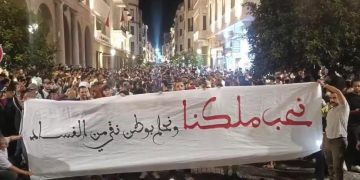GenZ 212, a leaderless movement calling for systemic change, has been the focal point of massive youth-led protests in Morocco since late September 2025.
A nationwide call for reforms to Morocco’s underfunded healthcare and education systems, an end to corruption, and a reallocation of public funds from projects like the 2030 FIFA World Cup to social services has grown out of the protests, which were sparked by the tragic deaths of eight women at a hospital in Agadir during childbirth.
The protests tagged #GenZ212 (212 being the country’s international dialling code) were organised through social media sites such as Discord, TikTok, Instagram and Facebook and rapidly spread across cities such as Casablanca, Rabat, Agadir, Marrakech, Tangier, Salé, and Oujda.
Utilisation of digital platforms to organise #GenZ212 protests
The movement started on September 27 and is a strong, decentralised force that uses digital platforms to plan, organise, and reach a wider audience.
The movement’s digital hub is the GenZ 212 Discord server, which grew from 3,000 users to over 150,000 in a matter of days. Anonymous organisers leverage the platform to discuss demands, cast votes for protest sites, and plan actions in real time—often making announcements just hours before they happen.
Although authorities have targeted the families of suspected organisers, suppression of major organisers has been difficult due to this decentralised structure, which lacks formal leaders and party affiliations.
The demonstrations have been further heightened by TikTok, Instagram, and X, with the hashtag #GenZ212 trending extensively and receiving millions of views.
Influencers and the Moroccan diaspora have endorsed the outrage and mobilisation sparked by viral videos of police crackdowns and slogans like “Stadiums are here, but where are the hospitals?”
These platforms allow users to quickly and anonymously coordinate protests and share footage in real time, turning local complaints into a unified national movement.
Discord’s private servers and encrypted chats offer a secure planning environment, while TikTok and Instagram’s visual reach encourage wider involvement.
Like Gen Z uprisings worldwide, Morocco’s tech-savvy youth are using the internet to circumvent established systems and maintain momentum in the face of crackdowns.
Protesters’ suppression
Even though the protests had resulted in at least three fatalities, hundreds of injuries, and more than 400 arrests, Prime Minister Aziz Akhannouch’s administration has praised the security responses and stated an openness to dialogue, but demonstrators and Amnesty International have demanded the government’s removal.
However, Amnesty International has demanded an independent inquiry into excessive force.
Although the government has offered dialogue, pressure is growing as protests continue to shape the 2026 elections. Morocco’s youth are using technology to demand a future that prioritises their needs over symbolic megaprojects, and GenZ 212’s digital prowess highlights this new era of activism.











